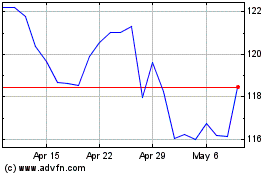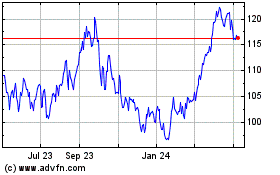Saudi Energy Minister Sees End of Oil-Price Slump
October 19 2016 - 7:00AM
Dow Jones News
LONDON—Saudi Arabia's energy minister delivered an optimistic
message to the oil industry's biggest operators on Wednesday,
saying a crippling oil-price downturn was coming to an end and
urging new investments to avert a supply shortage in the
future.
Speaking at the Oil & Money conference here, Khalid
al-Falih, the top oil official in the country that exports more
crude than any other, said the Organization of the Petroleum
Exporting Countries' agreement last month to modestly cut its
output would speed along a rebalancing of supply and demand already
under way.
"We are now at the end of a considerable downturn," Mr. Falih
told an audience that included top executives from oil firms such
as Exxon Mobil Corp., Royal Dutch Shell PLC and Total SA.
In his five months as Saudi energy minister, Mr. Falih has
overseen a significant change in the kingdom's oil policy, turning
it away from strategies aimed primarily at surviving an era of
ultralow prices. Mr. Falih has instead pointed the kingdom back in
the direction of its traditional role of stabilizing prices by
regulating the output of OPEC, the 14 nation cartel that controls
over a third of world crude production.
OPEC agreed to trim its output by 1% to 2% but left many of the
details of the cut to its next meeting on Nov. 30. Many
oil-industry analysts have been skeptical that OPEC will follow
through, but Mr. Falih said the accord will help lift prices and
spur more oil investments.
Mr. Falih said the oil industry was starved of financing during
a downturn over the past two years in which crude prices fell to
less than $28 a barrel this year from heights of $114 a barrel in
2014. According to Wood Mackenzie, a Scottish energy consultancy,
the oil industry has slashed $1 trillion in capital spending in the
past two years.
Mr. Falih said the industry needed $24 trillion in new capital
spending if it is to meet global energy demands over the next 25
years. Speaking to an audience that included bankers from London's
powerful financial institutions, Mr. Falih, Falih said the
reluctance many of them had to lend to energy companies would ease
as oil prices rise.
Mr. Falih warned of a supply shortage in the future if these
investments aren't made because global oil demand would keep
growing. "It could grow faster as the global economy improves," Mr.
Falih said, citing an increasing car fleet in China and rising
consumption in India.
Mr. Falih said he was encouraged by the signals from non-OPEC
producers that they would help to stabilize the oil market. Russia,
the world's largest producer of crude but not an OPEC member, sent
officials to meet with OPEC members such as Algeria, Saudi Arabia
and Venezuela in Istanbul earlier this month.
Write to Benoit Faucon at benoit.faucon@wsj.com and Kevin Baxter
at Kevin.Baxter@wsj.com
(END) Dow Jones Newswires
October 19, 2016 06:45 ET (10:45 GMT)
Copyright (c) 2016 Dow Jones & Company, Inc.
Exxon Mobil (NYSE:XOM)
Historical Stock Chart
From Mar 2024 to Apr 2024

Exxon Mobil (NYSE:XOM)
Historical Stock Chart
From Apr 2023 to Apr 2024
